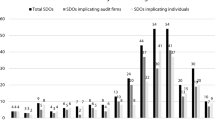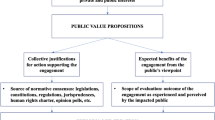Abstract
Previous accounting ethics research berates auditors for ethical lapses that contribute to the failure of Andersen (e.g., Duska, R.: 2005, Journal of Business Ethics 57, 17–29; Staubus, G.: 2005, Journal of Business Ethics 57, 5–15; however, some of the blame must also fall on regulatory and professional bodies that exist to mitigate auditors’ ethical lapses. In this paper, we consider the ethical and economic context that existed and facilitated Andersen’s failure. Our analysis is grounded in Akerlof’s (1970, Quarterly Journal of Economics August, 488–500) Theory of the Market for Lemons and we characterize the market for audit reports as a market for lemons. Consistent with Akerlof’s model, we consider the appropriateness of the countervailing mechanisms that existed at the time of Andersen’s demise that appeared to have effectively failed in counteracting Andersen’s ethical shortcomings. Finally, we assess the appropriateness of the remedies proposed by the Sarbanes–Oxley Act of 2002 (SOA) to ensure that similar ethical lapses will not occur in the future. Our analysis indicates that the SOA regulatory reforms should counteract some of the necessary conditions of the Lemons Model, and thereby mitigate the likelihood of audit failures. However, we contend that the effectiveness of the SOA critically depends upon the focus and attention of the␣Public Companies Accounting Oversight Board (PCAOB) towards assessing the ethical climates of public accounting firms. Assessments by the PCAOB of public accounting firm’s ethical climate are needed to sufficiently ensure that public accounting firms effectively promote and maintain audit quality in situations where unconscious bias or economic incentives may erode the public accounting firm’s independence.
Similar content being viewed by others
References
Akerlof, G. A.: 1970, The Market for ‘Lemons’: Quality Uncertainty and the Market for Lemons. Quarterly Journal of Economics. August, 488–500.
Alexander D., Burns G., Manor R., McRoberts F., Torriero E. A. (2002) Greed Tarnished Golden Reputation. Chicago Tribune 1(September): 1
Allen F. (1984) Reputation and Product Quality. The RAND Journal of Economics 15: 311–327
Appelbaum S. H., Deguire K. J., Lay M. (2005) The Relationship of Ethical Climate to Deviant Workplace Behavior. Corporate Governance 5(4): 43–55
Arens A. A., Elder R. J., Beasley M. S. (2006) Auditing and Assurance Services: An Integrated Approach, 11th edition. Upper Saddle River, New Jersey, Prentice Hall
Ayers S., Kaplan S. E. (1998) Potential Differences Between Engagement and Risk Review Partners and Their Effect on Client Acceptance Judgments. Accounting Horizons 12(June):139–153
Baucus M. S., Beck-Dudley C. L. (2005) Designing Ethical Organizations: Avoiding the Long-term Negative Effects of Rewards and Punishments. Journal of Business Ethics 56: 355–370
Bazerman, M., G. Lowenstein and D. Moore: 2002, Why Good accountants do bad audits. Harvard Business Review, November 2002, Harvard Business School Publishing Corporation, Product no. 2217.
Bean L. (2004) Rebates: Do the Big Four Need an Ethics Audit? Journal of Corporate Accounting and Finance 15(4): 37–40
Benston G. J., Hartgraves A. L. (2002) Enron: What Happened and What We can learn from it. Journal of Accounting and Public Policy 21(Summer): 105–127
Brown L. D, Caylor M. L. (2005) A Temporal Analysis of Quarterly Earnings Thresholds: Propensities and Valuation Consequences. The Accounting Review 80: 423–440
Brown M. E., Treviño L. K., Harrison D. A. (2005) Ethical Leadership: A Social Learning Perspective for Construct Development and Testing. Organizational Behavior and Human Decision Processes 97: 117–134
Castellano, J. F. and S. S.: 2005, Using Cultural Audits to Assess Tone at the Top. The CPA Journal 75(Feb), 6, 8, 10–11.
Chaney P., Philipich K. (2002) Shredded Reputation: The Cost of Audit Failure. Journal of Accounting Research 40(4): 1221–1245
Coffee, J. C. Jr.: 2002, Understanding Enron: It’s about the Gatekeepers, Stupid. Working Paper, Columbia University. July 20; Working Paper No. 207.
Cunningham L. A. (2004) The Appeals and Limits of Internal Controls to Fight Fraud, Terrorism, and other Ills. Journal of Corporation Law 29(2): 267–346
Diamond M. (2005) Accounting Education, Research and Practice: After Enron, Where do We go?. European Accounting Review 14(2): 353–362
Doogar, R., T. Sougiannis, H. Xie.: 2003, The Impairment of Auditor Credibility: Stock Market Evidence from the Enron–Andersen Saga. Working paper, University of Illinois.
Duska R. (2005) The Good Auditor—Skeptic or Wealth Accumulator? Ethical Lessons Learned from the Arthur Andersen Debacle. Journal of Business Ethics 57: 17–29
Enron Special Investigation Committee (2002) Report of the Special Investigation Explanation. Commercial Clearing House, Chicago, Ill
Gaa J. (1994) Ethical Foundations of Public Accounting. Certified General Accountants’ Research Foundation, Vancouver
Gendron Y. (2001) The Difficult Client-acceptance Decision in Canadian Audit Firms: A Field Investigation. Contemporary Accounting Research 18(2): 283–310
Gibbins M., Salterio S., Webb A. (2001) Evidence about Auditor-client Management Negotiation Concerning Client’s Financial Reporting. Journal of Accounting Research 39(3): 535–563
Grojean M. W., Resnick C. J., Dickson M. W., Smith D. B. (2004) Leaders, Values, and Organizational Climate: Examining Leadership Strategies for Establishing an Organizational Climate Regarding Ethics. Journal of Business Ethics 55: 223–241
Jensen M. C., Meckling W. H. (1976) Theory of the Firm: Managerial Behavior, Agency Costs and Ownership Structure. Journal of Financial Economics 3(October): 305–360
Kerton R. R., Bodell R. H. (1995) Quality, Choice, and the Economics of Concealment: The Marketing of Lemons. The Journal of Consumer Affairs 29(1): 1–28
Klein B., Leffler K. B. (1981) The Role of Market Forces in Assuring Contractual Performance. Journal of Political Economy 89: 615–641
Knechel, W. R.: 2001. Auditing: Assurance and Risk, 2nd Edition (South-Western College Publishing, Cincinnati, Ohio)
Neice J. M., Trompeter G. M. (2004) The Demise of Arthur Andersen’s One-firm Concept: A Case Study in Corporate Governance. Business and Society Review 109(2): 183–207
O’Connor, S.M.: 2002, The Inevitability of Enron and the Impossibility of “Auditor Independence” under the Current Audit System. Working paper, University of Pittsburgh Law School.
Palmrose Z. (1988) An Analysis of Auditor Litigation and Audit Service Quality. The Accounting Review 63(1): 55–74
Revsine L. (2002) Enron: Sad But Inevitable. Journal of Accounting and Public Policy 21(Summer): 137–145
Ricchiute D. N. (2003) Auditing and Assurance Services, 7th edition. Southwestern Thomson Learning, Mason, Ohio
Rockness H., Rockness J. (2005) Legislated Ethics: From Enron to Sarbanes–Oxley, the Impact on Corporate America. Journal of Business Ethics 57: 31–54
Rogers, R. K., J. Dillard and K. Yuthas: 2005, ‘Accounting’, ‘Profession’, ‘Change’, ‘Image’, ‘Management’, Journal of Business Ethics 58, 159–176
Rogerson W. P. (1983) Reputation and Product Quality. Bell Journal of Economics 14: 508–516
Satava D., Caldwell C., Richards L. (2006) Ethics and the Auditing Culture: Rethinking the Foundation of Accounting and Auditing. Journal of Business Ethics 64: 261–284
Schminke M., Ambrose M. L., Neubaum D. O. (2005) The Effect of Leader Moral Development on Ethical Climate and Employee Attitudes. Organizational Behavior and Human Decision Processes 97: 135–151
Schwartz M. S., Dunfee T. W., Kline M. J. (2005) Tone at the Top: An Ethics Code for Directors. Journal of Business Ethics 58: 79-100
Shapiro C. (1982) Consumer Information, Product Quality, and Seller Reputation. Bell Journal of Economics 13: 20–35
Sims R. R. (1992) The Challenge of Ethical Behavior in Organizations. Journal of Business Ethics 11: 505–513
Sims R. R. (2000) Changing an Organization’s Culture under New Leadership. Journal of Business Ethics 25: 65–78
Staubus G. (2005) Ethical Failures in Corporate Financial Reporting. Journal of Business Ethics 57: 5–15
Toffler B. L., Reingold J. (2003) Final Accounting: Ambition, Greed and the Fall of Arthur Andersen. Broadway Publishing, New York, New York
Treviño L. K., Brown M. E. (2004) Managing to be Ethical: Debunking Five Business Ethics Myths. Academy of Management Executive 18(2): 69–81
Vardi Y. (2001) The Effects of Organizational and Ethical Climates on Misconduct at Work. Journal of Business Ethics 29: 325–337
Verschoor C. C. (2004) The Ethical Climate Barometer. The Internal Auditor 61(Oct): 48–53
Victor B., Cullen J. B. (1987) A Theory and Measure of Ethical Climate in Organizations. In: Frederick W. C., Preston L. (eds) Research in Corporate Social Performance and Policy, vol. 9. JAI Press Inc., Greenwich, CT., pp. 51–71
Waring, C. G.: 2004, Measuring Ethical Climate Risk. The Internal Auditor 61(Dec): 71, 73, 75.
Author information
Authors and Affiliations
Corresponding author
Rights and permissions
About this article
Cite this article
Kaplan, S.E., Roush, P.B. & Thorne, L. Andersen and the Market for Lemons in Audit Reports. J Bus Ethics 70, 363–373 (2007). https://doi.org/10.1007/s10551-006-9115-4
Received:
Accepted:
Published:
Issue Date:
DOI: https://doi.org/10.1007/s10551-006-9115-4




